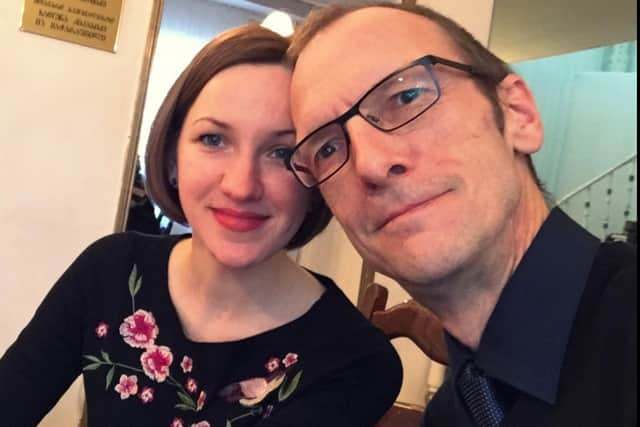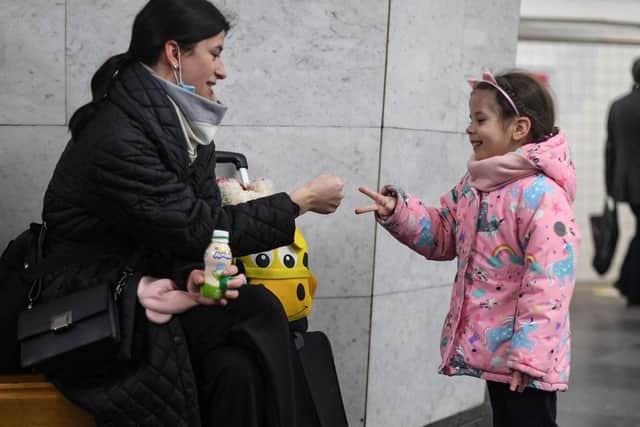Russia-Ukraine conflict: Scot in Ukraine makes plans to flee as he hears gunfire from his home and says ‘it’s getting closer’
and live on Freeview channel 276
An air base just a few miles away from his house was attacked on Thursday afternoon and military planes are flying overhead.
"I can hear military jets in the distance and you can hear gunfire as well, like large calibre – tanks, helicopters, it’s pretty heavy,” says Mr Stewart, from Edinburgh. He is sheltering at home with his wife Tania and two young children Yaryna, three, and Douglas, who was born just two weeks ago, as well as his father in law and mother-in-law, who is undergoing treatment for breast cancer.
Advertisement
Hide AdAdvertisement
Hide Ad"We just heard that our local airfield here, the Antonov airfield, which is the home to the biggest aircraft in the world, has been attacked. Just in the last hour. That's pretty near us, about a 20-minute drive from here. So it's getting closer.”


Mr Stewart is making plans to flee the area to protect Yaryna and Douglas, booking accommodation in the west of Ukraine where the family could shelter temporarily.
However, they are currently unable to return to Scotland due to a visa delay for Tania, who has recently been discharged from hospital following a caesarean section. A visa appointment at the British Embassy in Kiev had been scheduled for Friday.
"That’s not going to happen now,” Mr Stewart says. “And it's extremely stressful.


Advertisement
Hide AdAdvertisement
Hide Ad"We're only concerned for [the children’s] safety and I'm concerned for my wife’s safety. That's the thing that's worrying me – what do we do? Do we stay here? Or do we get out and get the children to safety? The fact is, I'd like to get my children away from this. I'd like them to be safe.
"It's a difficult situation. I'm torn because I don't want to leave this country. I've lived here for 15 years. It's my wife's country. My kids have dual nationality, it's their birthplace. We don't want to go, but we don't want them to be in any danger.”
Mr Stewart’s brother in Scotland has written to the family’s MP, Richard Thomson, again to push for an emergency visa to be granted.
If able to travel, Mr Stewart is considering taking his young family on a six-hour drive to Poland, where they could fly home to Scotland. However, he is unclear how easy a journey will be. He has seen a constant flow of heavy traffic on the Warsaw highway outside Kyiv and huge queues at petrol stations.
Advertisement
Hide AdAdvertisement
Hide AdMr Stewart says: "We just don't know what's going to happen in the next hour or even two hours, three hours, the next day. We don't know if it's going to be full scale, like World War Two style, or how they are going to behave towards civilians.
"This kind of thing we just don't know. At the moment, they're supposedly keeping it to military targets, but they don't seem to care about the perception of the world. So that's quite dangerous.”
It had been expected any invasion would begin in the east of Ukraine, where Mr Putin said earlier this week he would recognise the breakaway regions of Donetsk and Luhansk, in breach of a peace agreement signed after the earlier conflict in the area in 2014.
However, a missile attack on the airport at Ivano-Frankivsk in the west of the country is one of a number of assaults on targets across Ukraine following a dawn announcement of a “special military operation” by Russian president Vladimir Putin.
Advertisement
Hide AdAdvertisement
Hide AdUkrainian teacher Ivan* was awoken by a 6am phone call from his sister telling him the airport close to her home in the west of the country had been attacked by Russian forces.
"It was mind-blowing,” said Ivan, who lives in the mountains with his wife and two children. "This area, in the west, was the last place we expected to be attacked. We had thought it would be in the east of the country. We expected the western parts to be the safest place, but it feels like it's not anymore. It is not a pleasant feeling.
"When my sister called and said we were attacked, we couldn’t believe it. She heard the explosion and saw the smoke. Some people’s windows cracked.”
An hour later, he received a message from his children’s school telling him they would revert to home learning indefinitely amid a stay at home order from the Ukrainian Government, which has declared a state of emergency.
Advertisement
Hide AdAdvertisement
Hide Ad"I went into the local town at around 8am as I needed some food for breakfast and no-one I saw there had heard anything,” Ivan told The Scotsman.
“Then the news started to come in on the internet. I have heard since that there are queues at the shops, everyone is trying to buy things they need to stock up – food and medicines. Nobody knows what's going to happen and everyone is sure that there will be some kind of shortage of goods and so, they're panicking.
"I think this is not what we should do because that's additional load to the economy, but I have bought a couple of things as I have kids and I want to be sure that we're not going to starve in the next weeks or months. If you're responsible just for yourself, it's a bit different to when you have a wife and kids.”
Sean Cusick from Glasgow told radio station Heart Scotland that he and his wife and her two year old son were trapped in the eastern city of Kharkiv.
Advertisement
Hide AdAdvertisement
Hide AdHe said: “We were woken up at 4.30, 5 in the morning with huge explosions. I felt them first and started to hear the rumble, again and again. We’ve been told by the authorities to stay home and all of the airports have being attacked and are not useable, the civilian airspace is dead.
"I came to Ukraine to get married with my partner in November and since then, we’ve been trying to leave. She doesn’t have documents, she was supposed to pick up her national ID today to apply for a renewal of passport today, but obviously that’s not going to happen.”
In Kyiv, English language newspaper The Kyiv Post said its website had been under cyber attack since the Russian operation began.
It said on Twitter: “Our main Kyiv Post site has been under constant cyber attack today from the moment Russia launched its military offensive against Ukraine. We are, and will be, doing our best to keep you informed in this difficult time.”
Advertisement
Hide AdAdvertisement
Hide AdIvan said there had been reports of internet and phone blackouts, but that he believed the problems could be due to congestion on the network.
"This morning, people said they could not get through to friends and relatives, but everyone was trying to phone at once, which I think was the problem,” he says. “The problem is misinformation. There is so much misinformation from Russia targeted at Ukrainians and some people believe it.
"At this point, we're staying at home [and don’t plan to leave Ukraine]. But everything depends, I can't say for sure.”
In Belarus, where Russian troops have been lined up on the border with Ukraine for extensive war games exercises ahead of the invasion, it has been reported bank cards have been cut off and exchange rates for foreign currency have soared, amid fears of the country’s involvement in the war. The Belarusian border, where dictator Alexander Lukashenko is an ally of the Kremlin, has become a front for the invasion.
Advertisement
Hide AdAdvertisement
Hide AdOne resident told The Scotsman that police were visible on the streets as citizens stockpiled food at local stores, where there are already believed to be shortages.
"People are buying flour, sugar, rice and buckwheat, though we cannot buy much,” the resident said.
A spokeswoman for the People’s Consulate of Belarus in Scotland said: “Our thoughts and solidarity are with the people of Ukraine at this hour. There is no justification for cynical lies, violence, and cruelty of mad dictators, who are targeting innocent people on Ukrainian land. We know that those who are committing this terrible crime will have their inevitable punishment.”
A message from the Editor:
Thank you for reading this article. We're more reliant on your support than ever as the shift in consumer habits brought about by Coronavirus impacts our advertisers.
If you haven't already, please consider supporting our trusted, fact-checked journalism by taking out a digital subscription.
Comment Guidelines
National World encourages reader discussion on our stories. User feedback, insights and back-and-forth exchanges add a rich layer of context to reporting. Please review our Community Guidelines before commenting.
